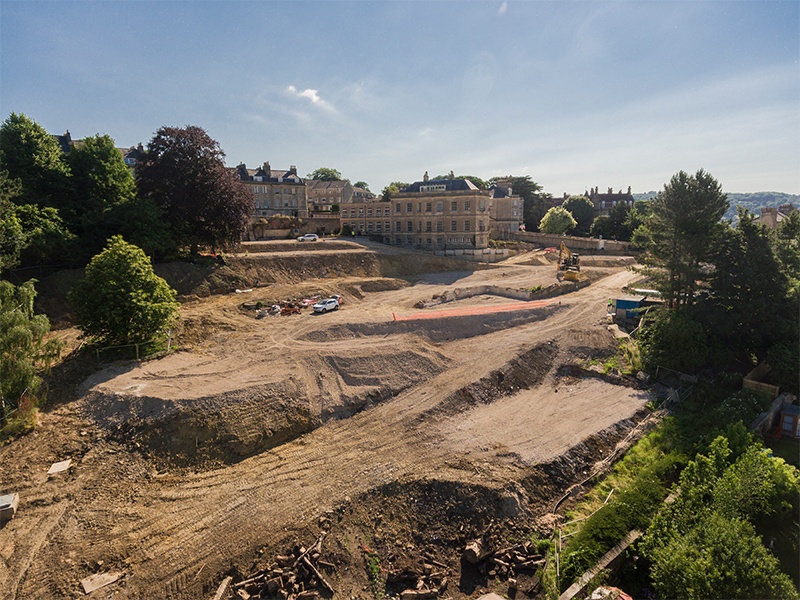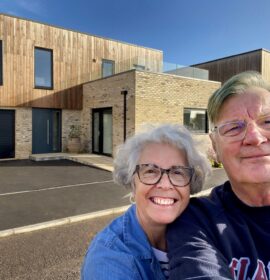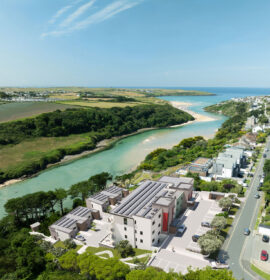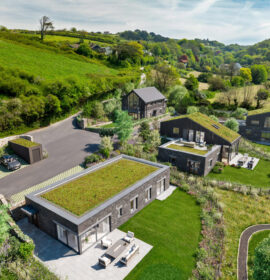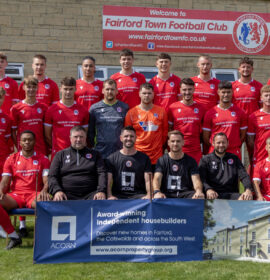
To celebrate both International Women’s Day and Women in Construction Week we’re championing some of our female Acorn team members. The world of construction can still be largely male dominated, but here at Acorn, we challenge the norm and provide equal opportunities across the workplace – from Development Managers to Site Managers, Procurement to Design – read about 4 of our female colleagues who, at different stages of their careers, are breaking the bias and leaning in to every opportunity that has come their way to forge fantastic careers in the property industry.
 Can you tell us a little bit about your role at Acorn?
Can you tell us a little bit about your role at Acorn?
Jacqui: I am a Development Manager with the in-house Architects Team for Acorn Property Group, based in London. My role involves working closely with the land team on a variety of projects in London and across the regions acting as both architectural designer and development manager depending on the project.
Georgia: I am an Assistant Development Manager for the Bristol region. My position involves assisting the development team with a variety of duties from acquisition to handover. My responsibilities involve dealing with planning applications, attending project meetings, site visits, liaising with consultants and generally facilitating the day-to-day management of several projects.
Annika: I manage the AHCS (Acorn Homes Construction Solutions) buying team for purchasing of materials for sites and ongoing management of tendering and performance of supply chain partners. The buying team review the drawings and specification on a site and identify the products that need to be purchased and ensure that orders are supplied to site teams to get their building materials in. We also identify products to overcome design challenges and monitor stock levels / issues on site.
Sophie: My role as a Land and Planning Graduate for Acorn Blue, the Cornish region of Acorn, is focused on land acquisition. I engage with landowners and estate agents to discuss potential land sales, attend networking events to meet new people or support existing relationships, sketch up potential development schemes and appraise the viability of the project. I also help with projects in the planning stage, which includes tasks such as submitting planning applications, attending public consultations and creating valuation packs.
What’s your background, how long have you been at Acorn and what was your route to getting into your current role?
Jacqui: I have always been interested in construction. My first project at the age of eleven was building a septic tank with my Dad in the long hot summer of 1976. Not a very salubrious project but my eleven-year-old self never felt prouder than on completion!
I graduated as an Architectural Technologist from CIT in Cork, Ireland and moved to London in the mid-eighties. I studied for my ‘part one’ at Greenwich University and gained experience in a variety of architectural practices, focusing on housing, master planning and place making.
I was appointed Design Director for a mid-size London based property developer in 2009 heading up the in-house architects practice, delivering mixed use residential planning approvals on complex brownfield sites.
I joined Acorn in September 2021. I admire the approach to sustainability and commitment to delivering high quality homes and enjoy the variety of projects residential and commercial I’ve been involved with in my relatively short time with the group.
Georgia: After obtaining a BA Honours degree in Property Development and Planning, I decided to further expand my knowledge by undertaking an MSc Degree in Sustainable Development.
While at University, I completed a year’s work experience at Cadwyn Housing Association in Cardiff as a Development Officer. In addition to this, I also worked at Lidl GB, Bristol, in the property department.
I began my postgraduate job search when I was in the last few months of my master’s degree. I registered my interest in Acorn – and here I am! I have been really enjoying my work since I joined the company in May 2022.
Sophie: Acorn is my first post-graduate job, which I started in April 2022. Previously, I studied Geography at Plymouth university and graduated with a 2:1. Despite geography not being directly linked to land development and planning, the broad knowledge gained from the subject, as well as the computer analytical skills all contributed to me being accepted into a graduate position with Acorn. These skills were demonstrated in the interview process, which included a task designed to assess my approach, ability and current knowledge.
Annika: I have been at Acorn for a year and a half now. I started off in housebuilding working in Technical / Commercial admin and from there was promoted to an assistant buyer. I studied for two years part time whilst working on completing my construction HNC. I was then promoted to a full-time buyer. I gained experience in buying in different companies understanding how different businesses operate.
I used this knowledge and experience to come into AHCS to set up and enhance the buying processes as the Regional Buyer. In a year and a half we have increased the number of sites look after and have grown the team at which point I was promoted to Regional Buying Manager.
 Do you have a favourite site or project you’ve worked on and why?
Do you have a favourite site or project you’ve worked on and why?
Jacqui: The station carpark in Blackheath, London is a very attractive site with lots of technical challenges that are not immediately obvious on the ground. Developing a scheme to address the challenges and deliver an attractive and viable solution has not been straightforward but is what I enjoy doing the most. We still have hurdles to clear but it’s very satisfying to work on a project where the result of everyone’s efforts will be a vibrant addition to Blackheath Village that makes a positive contribution to people’s lives and the built environment.
Georgia: Yes – Hazel Green, Urchfont. The Development Manager for the site is currently on maternity leave, so I have been given extra responsibility for the site. It has been challenging at times with a few obstacles, but it has enabled me to get a good feel for the Development Manager role and gain valuable experience.
What is the biggest challenge you have faced in your role and how did you overcome this?
Jacqui: The ever more complex and rapidly changing landscape that is our planning system. The system feels broken for everyone. Planners struggle with being understaffed and underfunded, while small and medium-sized developers in particular battle with the impact on timescales and costs. The sheer weight of reports required at what is a very early stage in a project’s life continues to increase along with the very real difficulty in balancing the wide ranging and often conflicting standards that need to be met. There have been six housing ministers in the last year alone. Stability and clarity are urgently required from the Government to unlock the current situation so much needed housing can be delivered across the country.
Sophie: My biggest challenge faced in my role was the initial learning. My geography background meant I didn’t have a strong knowledge on planning and land development. Whilst I had a basic understanding, it was a challenge learning numerous abbreviations associated with land development and understanding different planning policies and the process of planning. I overcame the initial challenge of learning by working alongside colleagues for more challenging tasks – taking notes of new words or concepts and asking countless questions! I’m continuing to learn, however being more confident in my role I now have a far greater understanding of planning and development, which means learning is easier than it was at the beginning.
Annika: The last couple of years have been incredibly challenging with material shortages / constant price increases. It has been very difficult to keep track of availability and pricing. Unfortunately, we often don’t find out about material shortages and availability issues until the day we are supposed to receive the items so I have had to try and look ahead and have a plan B up my sleeve where possible. It is also very important to have a good working relationship with suppliers so we can try and find out what we can about issues ahead of the game or be at the top of the list for deliveries when there are shortages!
What’s the most enjoyable part of your role?
Jacqui: I enjoy being part of a team and get great satisfaction working on the forgotten, less glamorous and underutilised sites and seeing them transformed into vibrant sustainable communities.
Georgia: There are so many things I enjoy about my role – mainly getting to work with different departments across the organisation and watching how everyone works together to achieve a shared goal. One of the most rewarding things is seeing your work come to life right before your eyes – when you see the amazing homes at the end of all the hard work.
Sophie: So far, the most enjoyable thing I’ve done is aided in the submission of a planning application for Arla, Trevarrian. I attended the public consultation, helped during the design process, and have worked on providing more accurate measurements and drawings of the existing building. It’s the first project I’ve seen through planning preparation and I look forward to hearing a decision from the council.
Annika: Being able to see the houses develop from the initial planning stage all the way through to completion. I particularly enjoy reviewing the drawings at the early stage of the site to identify which products can be used to best achieve the desired aesthetics of a site within the budgets.
It is also very satisfying to be able to visit a site when a number of houses are built and you can see the street emerging. I enjoy hearing about customers moving in and being pleased with the end product.
How does it feel to be a female in a typically male dominated industry?
Jacqui: I was lucky to grow up in a family that didn’t have boys’ and girls’ games or chores. I played Gaelic football on an all-boys team and chopped wood, my brother baked amazing cakes, we all did our bit and played to our strengths. So, when I started out in the construction industry over thirty-five years ago and found myself the only woman around a meeting table or on site, it never occurred to me that it might be an issue. I had great support from my husband who is an architect and friends in the industry, so apart from the odd out-dated joke or crass comment, my experience overall has been a positive one. But I am acutely aware that mine isn’t every woman’s experience, I think I would have found it extremely challenging to manage the extremely long hours expected as the norm in architectural practice if I had children.
However, it’s good to see the landscape changing. With more women and people from diverse backgrounds entering the industry, inequality and the gender pay gap are starting to be tackled, but there is still a long way to go.
Georgia: Working in a male dominated field has its hurdles, but navigating and overcoming challenges has been great for my growth in both my personal and professional life. On the whole, I have found most people to be supportive as a young woman making a career for myself in the industry. I am not complacent though, I do understand how difficult it can be for women in the industry – it’s about working together to change attitudes and perceptions. Hopefully as more women – like me – carve a career for themselves in the industry, it will encourage other women to consider this as a viable career option.
Sophie: At first it was quite intimidating working in an office comprising mostly of men, however I found everyone to be really supportive and glad to have more women in the workplace. Despite my junior role in the industry I’m a valued member of the team and bring new ideas and enthusiasm into projects
Annika: I feel proud to be representing women in a male dominated industry. I think attitudes to women have improved a lot since I started in the industry. I think it is more noticeable when on site! I do think Acorn has a great working environment and ethos towards women in the company.
What are your top tips for any other women wanting to get into your role / the construction industry?
Georgia: Do your research – there are a lot of different roles and opportunities, with a variety of university courses/other learning on offer to support this career choice. Look for opportunities to talk to women in the industry – if possible, get a mentor. Don’t be afraid to try something different!
Jacqui: New career paths and opportunities in the construction industry are emerging to meet the challenges we face in delivering homes and addressing the impact on climate change. The next ten years will see huge shifts in the way we work and how we learn creating opportunities for those with skills in complex problem solving, creativity, emotional intelligence and working collaboratively.
My advice is to find your passion, do your research, and talk to as many people in your area of interest as possible. Don’t be afraid to be yourself, be curious, ask questions, get the help, and support you need for a stimulating and fulfilling career. The industry needs you!
Sophie: My top tips would be to express interest in property/planning/construction and engage with people who already work within this industry. This might be through sites such as LinkedIn or existing contacts – doing this might lead to new opportunities. Additionally, always apply for positions even if your previous experience or education isn’t directly related. Getting to talk to potential employers through job interviews or email might get your name out there and could open doors to other opportunities.
Annika:
- Don’t let any preconceived ideas about the industry hold you back from applying for roles in the industry.
- Studying is really good for helping you get an insight into the wider construction industry and in particular for the product / build knowledge you need as a Buyer.
- It can be a very fast paced and challenging role so a positive mindset and interest in problem solving is good.
- Don’t be afraid to be yourself and let your personality shine through when applying for roles / in your day to day job.

 Can you tell us a little bit about your role at Acorn?
Can you tell us a little bit about your role at Acorn?
 Do you have a favourite site or project you’ve worked on and why?
Do you have a favourite site or project you’ve worked on and why?